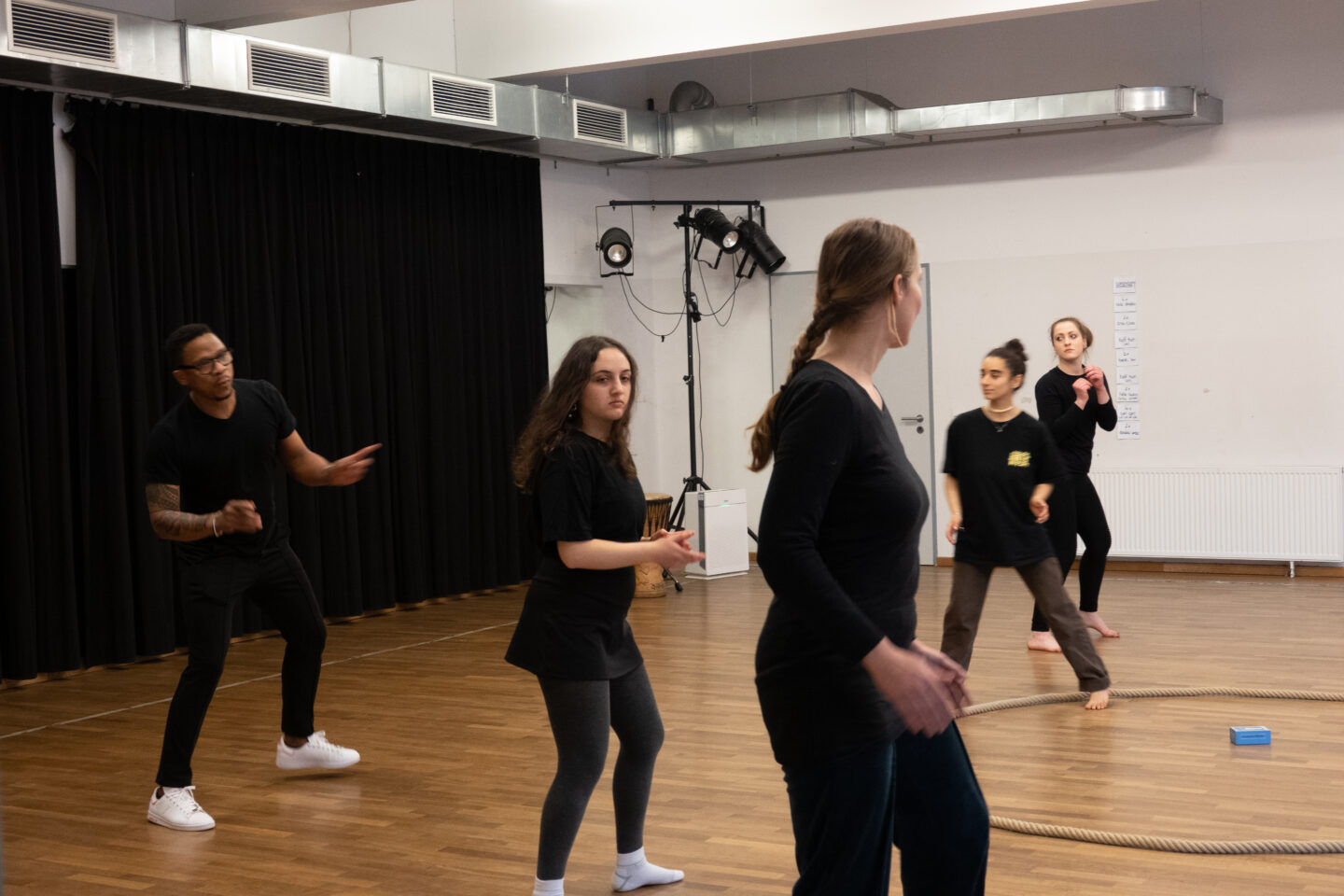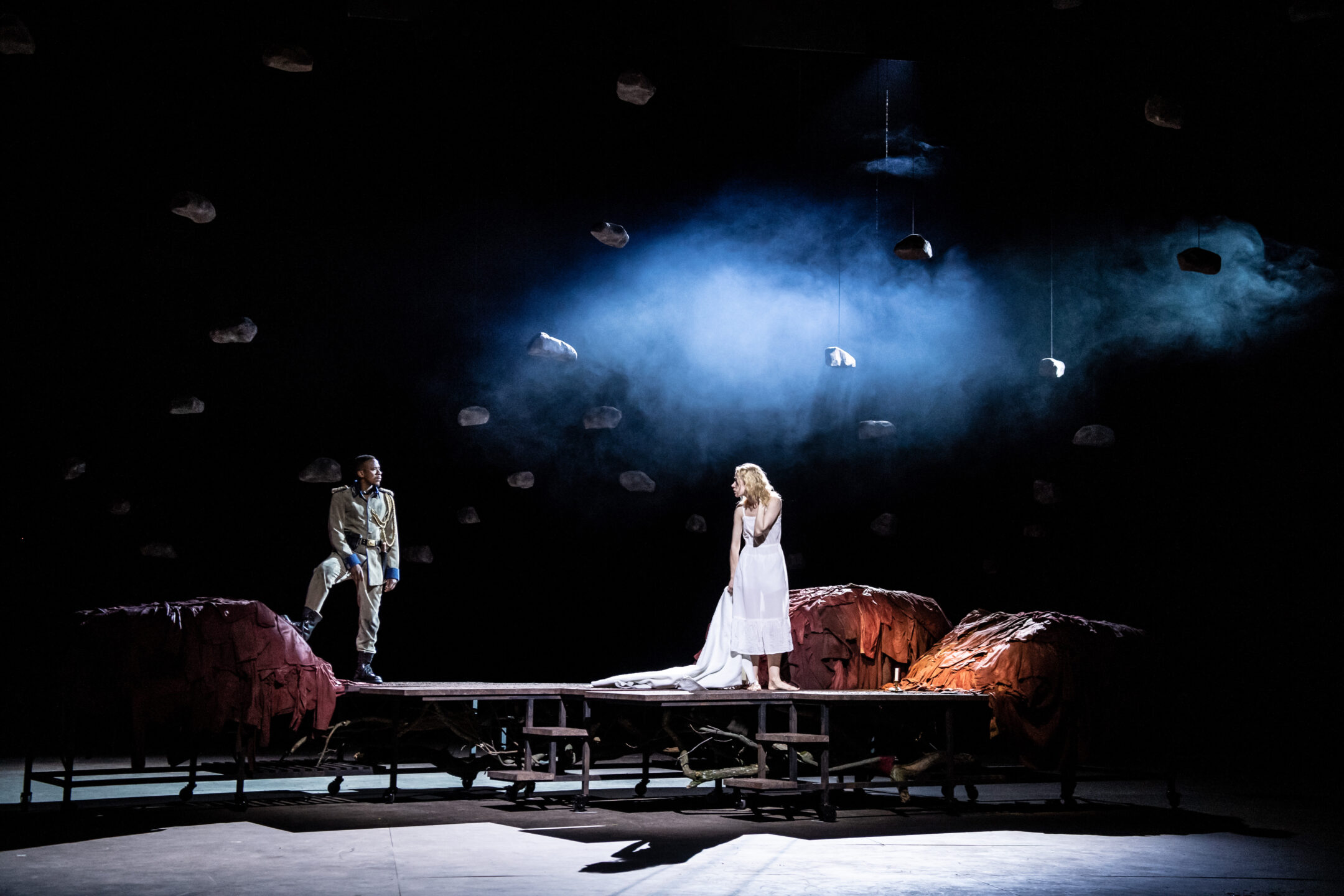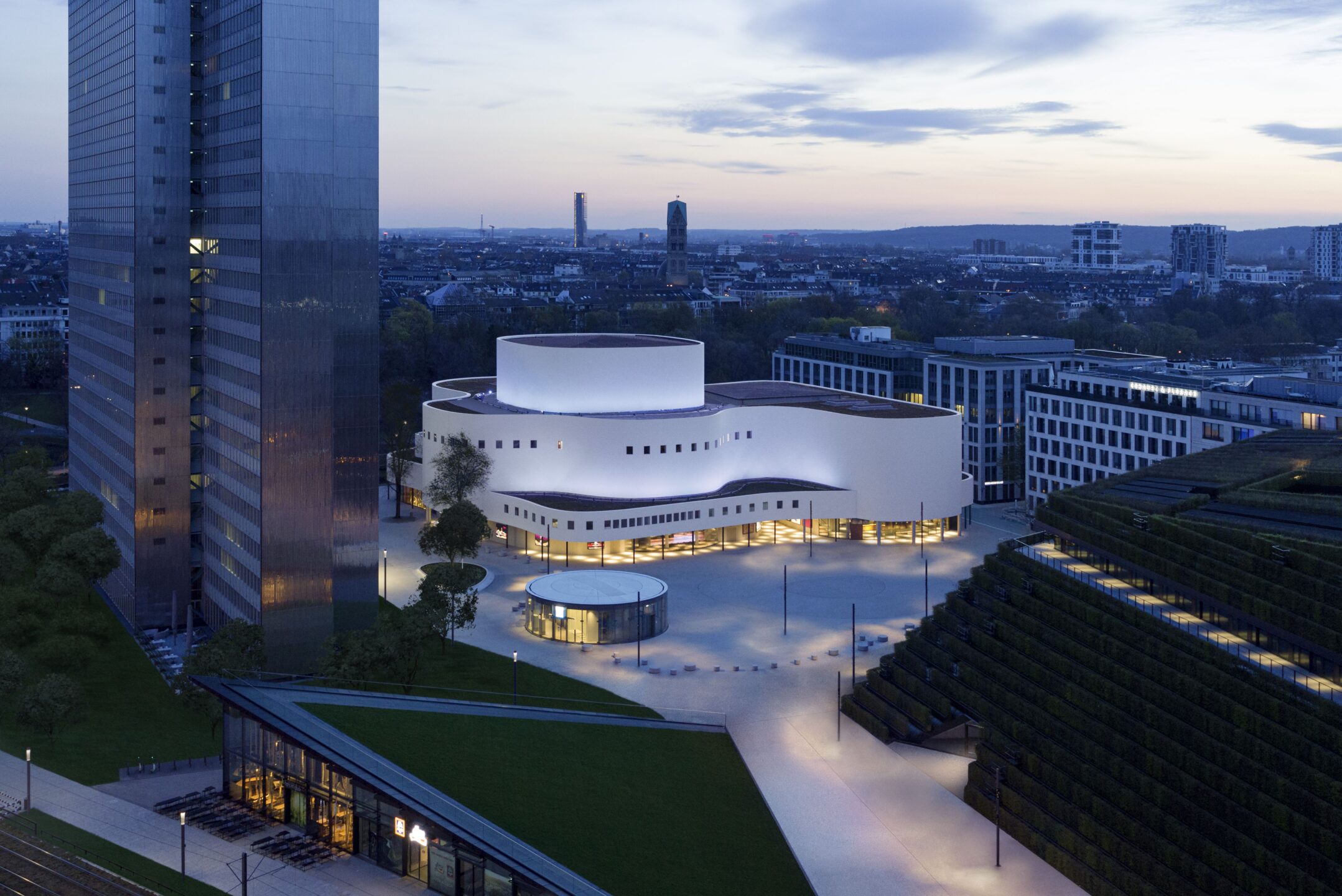Bongile Mantsai on Empowerment at Schauspielhaus Düsseldorf


As part of our new series, Düsseldorf Talks, we talk to people from the arts and cultural scene who have a personal connection to Düsseldorf about their ties to the city, and together we take a look at inspiring, beloved, and frequently visited places in Düsseldorf.
Words: Annalena Roters and Chris Erik Thomas.
Since being appointed as an artist in residence at the Düsseldorf Schauspielhaus, South African actor Bongile Mantsai has been a guest in the city for nearly a year. He opened the 2022/2023 season in the titular role in “Othello” as part of the production from South African director Lara Foot — reuniting with his longtime friend and colleague who he’d previously worked with in his home country. On view at the Schauspielhaus, the revamped version of “Othello” decolonizes the nearly 400-year-old Shakespearian classic, and is performed in German, English, and the South African language isiXhosha. This isn’t the only production keeping Mantsai occupied; he also appears as Walther Fürst in “William Tell.”
Off-stage, Mantsai has become one of South Africa’s best-known film and television actors, with roles in such works as the controversial film “Inxeba – the Wound,” which was shown at the Berlinale. When not busy in front of the screen, he’s also been active as a director and composer, and organized a theater festival called Zabalaza Theatre Festival in Cape Town.
We caught up with Mantsai for Art Düsseldorf Magazine to talk about his favorite spots in the city, the healing power of the stage, his role in giving young people access to acting and making their voices heard, and more.

"Othello" at Schauspielhaus Düsseldorf. Photo: Sandra Then.
You’ve been in the city working as an actor and artist in residence for a year at Schauspielhaus Düsseldorf. Can you tell us more about what you’re doing?
At the moment I’m doing “Othello” and I’m a part of “William Tell.” I was invited by the Schauspielhaus for “Othello,” which surprised me because I can only speak English, and the play is performed in German. I don’t understand the other people who speak German, so I need to read their body language.
Lara Foot, the director of “Othello,” staged the play so that German, English, and isiXhosa are spoken. Othello is about how the fear of otherness destroys love. In Lara Foot’s production, Shakespeare’s plot is linked to the colonial wars of the 19th and 20th centuries, such as German’s colonization of German South West Africa, now Namibia. Through the multilingual mise en scène, the director exposes a potential for conflict. What is it like for you as actors working in multiple languages?
One thing I’m happy about is that I can speak Xhosa in “Othello,” which is my native language. I feel free and happy that I can speak it here. There are many German actors, and we somehow understand each other despite of the different languages we speak – that is integration for me.
You and Lara Foot have a long-standing artistic friendship. How has it been working with her again?
It’s a big cycle for me because I’ve known Lara for years. When I moved from theater to television in South Africa, I didn’t see Lara for some time. Television changed my life. It’s like I became someone else — a celebrity. That’s not a very stable life. So when Lara asked me if I wanted to come to the Schauspielhaus, it felt like coming back to myself. When I came here, this grounded me. It’s just like therapy.
The Schauspielhaus … is where I can tell my stories the way I want to tell my stories without being judged.
Since you opened this season with “Othello,” you’ve been working as an artist in residence at the Schauspielhaus for an entire year. How long are you staying in Düsseldorf and do you feel comfortable here?
Yes, right now, I have three months left in Düsseldorf. It has been a very important time of self-development so far and feels like a healing process after being a television celebrity. It’s a calm and safe environment here. I can walk freely or take my bike, which I haven’t done for years. So to be able to work here with Lara means a lot to me.
Where do you like to go for a walk or ride? Which place in Düsseldorf do you like best so far?
I live in Golzheim, which I think is very bourgeois. I have the privilege of being close to the Rhine river there and it’s my favorite place in Düsseldorf. We have this system here at work where you skip two weeks and then do a play again. When I have time off I go to the Rhine, put on my headphones, pretend that I’m listening to someone, and I can just do my lines. It’s my space to be at peace.
I also learned a lot about Heinrich Heine, the German poet. I went to a restaurant close to the Heine museum. I’ve also discovered a place called Ghana Street, where I go get authentic African food. This particular food is so different from the food here, and sometimes I miss the taste.
My favorite place is The Schauspielhaus to be quite honest. This is where I can express myself; this is where I can tell my stories the way I want to tell my stories without being judged. I liberate myself in this place. When I go on stage, I can tell people what I want to tell, I can open my heart, and I can be vulnerable.

Schauspielhaus Düsseldorf. Courtesy of: ©ingenhoven architects HGEsch
Acting isn’t your only artistic passion. Tell us about the other things you do here.
I am giving workshops where I’m helping actors and participants. The first one was about being vulnerable. One of the participants introduced me to a place called “Kabawil.” It’s a theater space where I did another workshop last week. This time, the topics were “feeling included and excluded” and “what makes us privileged or unprivileged.” One of the things that fascinated me the most was a young lady who took a picture of her hand and when I asked her what it meant, she said: “It’s the color of my skin. It makes me privileged.”
Another thing I do besides acting is directing. I did a festival back in South Africa with Lara because we wanted to give young people a platform and for their voices to be heard.
This year, in our new SOLO section, Art Düsseldorf is showing works with a thematic focus on diversity, among other things. What do you think the cultural sector needs to do to enable more diversity? Where do you currently see the greatest need?
I think we need spaces like this to allow young people to open up. It’s rare to find young people in the audience; if we’re talking about diversity, spaces like this need to be diverse, not only for older people or rich people. We should also be open for exchange of culture so that when I come into a space like this, I don’t think, “I’m black.” Instead, I can feel like, “I’m an artist.” I have seen plays where there is diversity, but I still feel like I am missing young people in spaces like this. “Othello” is written in an old language, but who are we inviting with that? I don’t say the writers should change the scripts, but maybe we should modernize it to include a younger audience.
If we’re talking about diversity, spaces like this need to be diverse, not only for older people or rich people.
What are your future plans and projects this year?
I’m here until July. It’s interesting that you asked me this because I was looking at the program a couple of days back. I have four shows left of “Othello” and maybe four “Wilhelm Tell” shows before summer, and then the summer program shifts outside to open-air shows. I don’t know what the theater has planned for me but at the same time, I miss my home. I haven’t been to South Africa since last summer. The funny thing is, I’ve fallen in love [with Düsseldorf] now over a couple of months since the beginning of my time here. I’m at peace again.
Chris Erik Thomas is the Digital Editor of Art Düsseldorf. They work as a freelance writer and editor in Berlin and focus primarily on culture, art, and media. Their work can also be seen in Highsnobiety, The Face Magazine, and other publications.